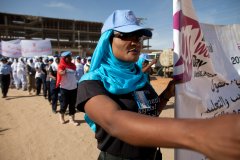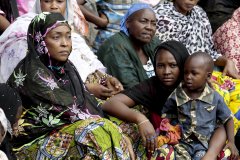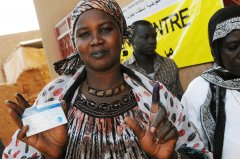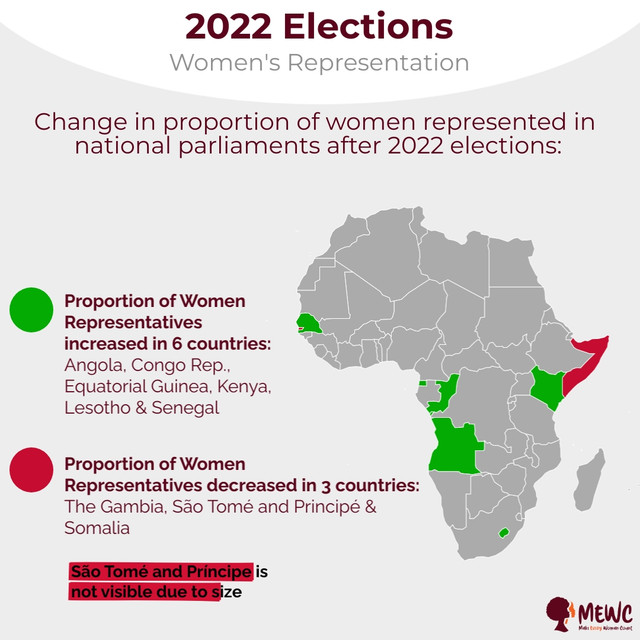Gender Issues Showlist
Women, Peace & Security
UNSCR 1325 calls on all parties to: protect and respect the rights of women and girls in conflict & post-conflict; increase women participation in all conflict resolution, peacekeeping and peace-building & to end impunity by prosecuting perpetrators of sexual and other violence on women and girls
index.php?option=com_content&view=category&id=56&Itemid=1913
Human Rights of Women
Thirty six years after the adoption of CEDAW, many women and girls still do not have equal opportunities to realize rights recognized by law. Women are denied the right to own property or inherit land. They face social exclusion, “honor killings”, FGM, trafficking, restricted mobility, early marriage,...
index.php?option=com_content&view=category&id=44&Itemid=1908
Violence Against Women
Violence against women is the most shameful human rights violation. Gender based violence not only violates human rights, but also hampers productivity, reduces human capital and undermines economic growth. It is estimated that up to 70 per cent of women experience violence in their lifetime
index.php?option=com_content&view=category&id=69&Itemid=1912
Political Participation & Leadership
Where women are fully represented, societies are more peaceful and stable. Women political participation is fundamental for gender equality and their representation in positions of leadership must be a priority for all Africans governments.
index.php?option=com_content&view=category&id=65&Itemid=1911
Latest News
- COTE D'IVOIRE: South-South Meeting to Promote Gender Equality and Combat Deforestation
- RWANDA: Rwanda Set to Launch Cervical Cancer Elimination Plan
- NIGERIA: Over 5,000 Nigerian Women Stranded in Iraq - Govt
- SUDAN: Healthcare Collapse Threatens Pregnant Women in Sudan's Sharg El Nil
- GHANA: President Nominates 12 More Ministers
- Senegal: Parliamentary election 2024
- Mauritius: Parliamentary election 2024
- Ghana: Presidential and Parliamentary Elections
- Botswana: Parliamentary elections 2024
- Algeria: Presidential Election 2024
SOUTHERN AFRICA: SADC Protocol on Gender and Development Ratified
Source: AllAfrica
Southern African Development Community (SADC) member states have ratified the SADC Protocol on Gender and Development which was signed in 2008 in South Africa.
Speaking in Lilongwe on Tuesday, head of the SADC gender and development programme Magdalene Madibela confirmed that Malawi has joined the ratification.
"I am happy to announce that the SADC Protocol on Gender and Development has entered into force. We already have received sufficient ratifications for the protocol now to be in effect.
Madibela said the ratification of the protocol would empower the member states to champion and implement the commitments they made.
"So essentially SADC member states are now ready to champion and implement the protocol on gender and development and effectively deliver on the commitments member states have made in gender equality and women empowerment," she said.
She said the key priorities on the protocol include constitutional and legal rights, governance, which revolves around ensuring equal representation and participation in political and decision making positions among others.
Madibela also bemoaned the challenges women are facing in Southern Africa.
"As we know, women in Southern Africa constitute more than 50 per cent of the poor and it a big problem. It is a concern. We want to make sure that women are removed from poverty.
"Access to property and resources are some of the other challenges women face as they do not have access to land and property, as such continue to suffer," she complained.
She said the SADC protocol on gender and women development was advancing very specific measures and commitments that member states should take to ensure that women also have access to productive resources including land and property.
Midibela also complained about gender based violence against women and said they would also look at addressing the problem from a legal point of view.
"We are really looking at addressing the problem from a legal point of view, putting in place the appropriate legislation to address the problem," she said.
Malawi is hosting the 2013 ordinary session of the SADC Heads of State and Government from 17 to 18 August.





